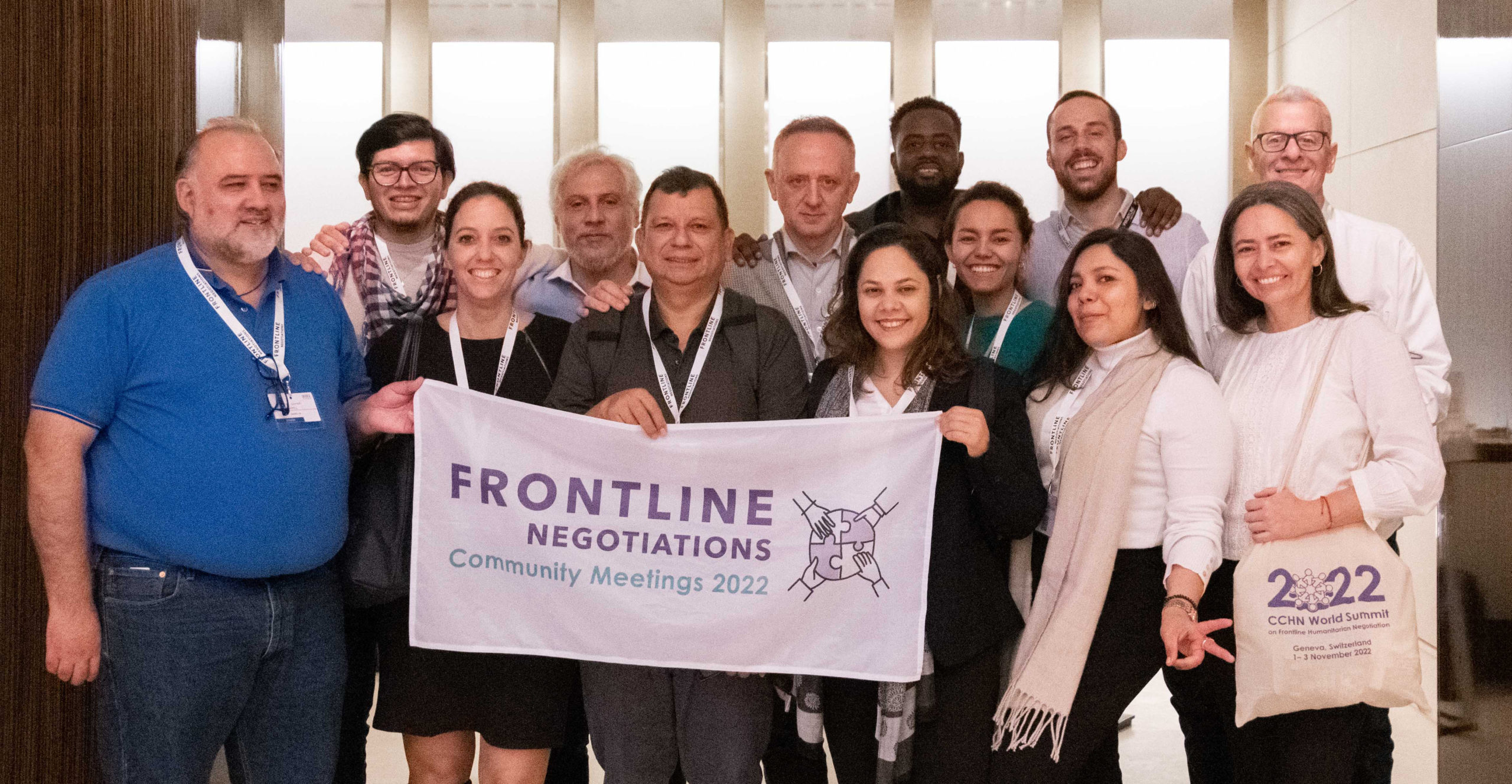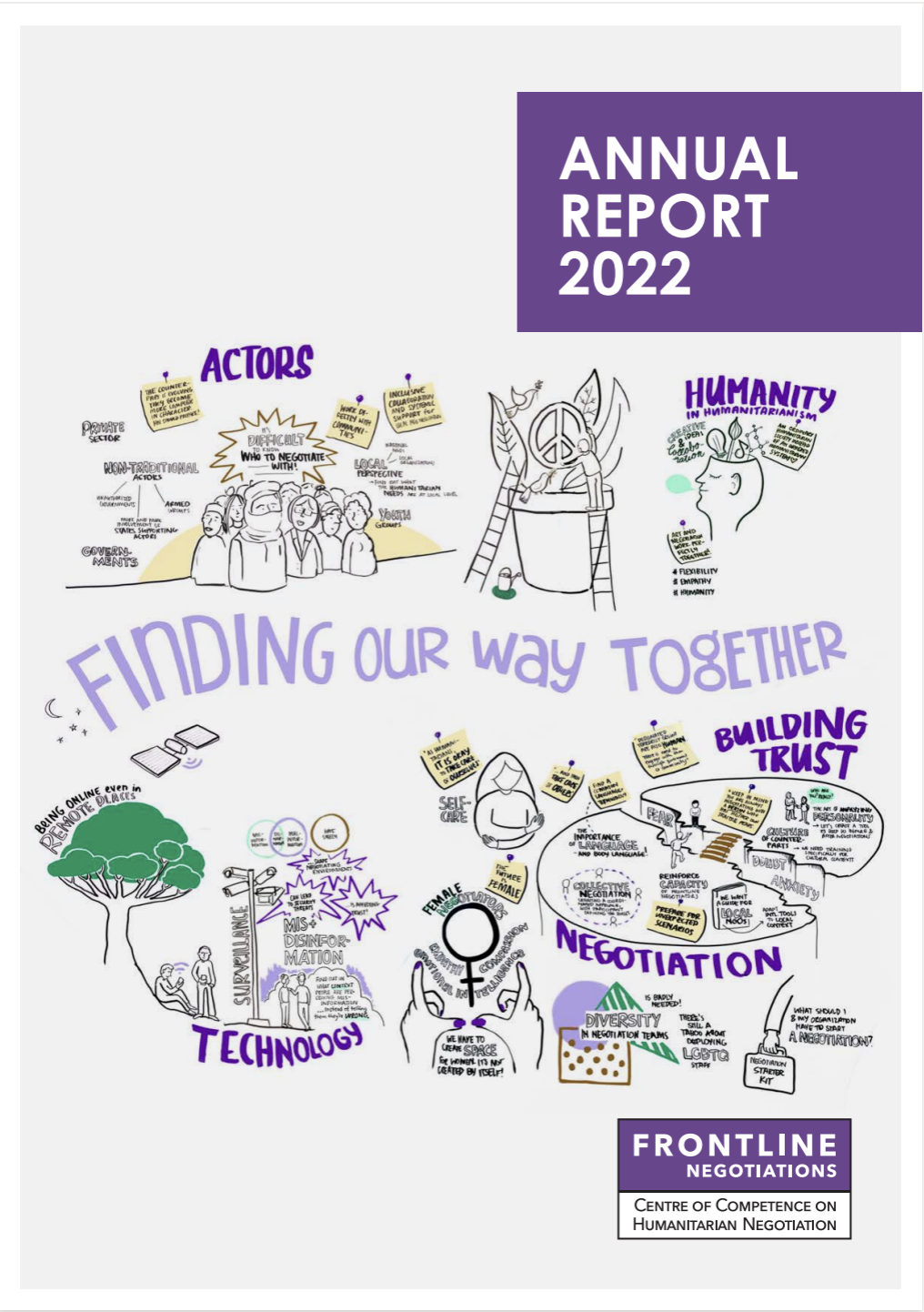
CCHN community members from Latin America and the Caribbean gather in Geneva for the World Summit on Humanitarian Negotiation in November 2022. Photo: Sophia Bennett
Six years after its creation, the Centre of Competence of Humanitarian Negotiation (CCHN) has evolved to become a leading initiative in the domain of frontline negotiations in the humanitarian sector.
By the end of 2022, some 5,000 individuals across more than 150 countries have benefitted from the CCHN’s learning opportunities – including negotiation workshops, peer activities, and other support services matching the challenges witnessed by professionals and organisations on the ground.
Discover what the CCHN has achieved in 2022.
A thriving global community of practice
During 2022, the CCHN community of practice – a network of frontline negotiators spanning the globe – expanded to include more than 2,000 additional humanitarian professionals who joined a CCHN workshop for the first time, bringing the total number of community members to 5,300.
The community did not only grow in numbers; members became more effective in spearheading the development of the community itself, increasingly contributing to the co-creation of negotiation tools, leading the reflections on emerging negotiation practices and delivering negotiation workshops in hard-to-reach areas with little to no support by CCHN staff.
It also became increasingly diverse, reaching staff members working for local and grassroots organisations as well as major humanitarian agencies.

A learning offer that meets humanitarians' needs
The CCHN continued to provide humanitarian workers with a wide range of practical, experiential humanitarian negotiation workshops which responded to the skills development needs faced on the ground. The CCHN also delivered pressure management workshops and retreats, thematic groups, sessions for mentors and mentees, negotiation simulations, and much more.
In 2022, the CCHN began piloting a new type of workshop called the Executive Programme, designed to support senior managers as they guide negotiation teams while remaining in compliance with the organisation’s mandate and operational objectives.
81
First-level
“Peer workshops”
2000+ participants
15
Trainings of Facilitators
184 participants
25
Thematic
sessions
150 participants
11
Negotiation simulations
85 participants
28
Mentoring events and gatherings
219 participants
Support for frontline negotiators across world regions and thematic areas
The CCHN conducted operational research on selected thematic areas. These topics were identified as a priority by community members across world regions, through frequent exchanges and interviews.
Between March and October 2022, the CCHN team travelled across 25 countries and organised virtual meetings to learn about the negotiation challenges that community members face or see lying ahead. This input was used to shape the agenda of the CCHN World Summit and to guide thematic work in the coming months.
Our focus areas for 2022 included…
✔ Protection negotiations
✔ Legitimacy, diversity and gender in negotiation teams
✔ Negotiatng healthcare in crises
✔ Negotiating with the help of interpreters
✔ Operational communication, mis- and disinformation
✔ Negotiating with gangs
✔ Pressure management, mentoring, and “community of care” activities
Tailored services for partner organisations and other humanitarian agencies
Throughout the year, the CCHN worked closely with its founding and strategic partners— the International Committee of the Red Cross, Médecins Sans Frontières, the UN High Commissioner for Refugees, the UN World Food Programme—as well as many other humanitarian agencies, supporting their capacity-building needs and adapting its learning offer to the constantly evolving demands of the most complex humanitarian contexts.
Humanitarian professionals working for the four mentioned agencies make up almost half of the entire community of practice.
“The truth is that most of us need to learn how to negotiate. The fact that you’re good at delivering food, or putting up shelters, or providing psychosocial support to a refugee does not mean that you are necessarily a very good negotiator. By learning together and exchanging approaches, we can learn so much from each other.”
Gillian Triggs,
Assistant High Commissioner for Protection
– UNHCR
Staff working for... (2022)
...attended a CCHN workshop
...became workshop facilitators
Read more in the 2022 annual report!
For any questions, please contact:
Barbara Sartore, Head of Communications
[email protected]

